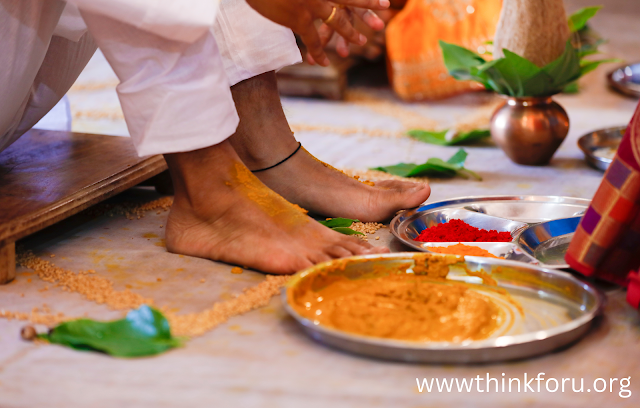"Haldi Kumkum" is a traditional practice in Hindu culture that involves the application of turmeric (haldi) and vermilion (kumkum) on the foreheads of married women. The term is a combination of two elements: "haldi," which refers to turmeric powder, and "kumkum," which is a red powder made from vermilion or red lead.
1. Religious and Ritualistic Significance: Haldi Kumkum is often used during religious ceremonies, especially during festivals like Karva Chauth, Varalakshmi Vratam, and other occasions where married women pray for the well-being and longevity of their husbands.
Additional aspects related to Haldi Kumkum:
Regional Variations:
Maharashtra and Karnataka: Haldi Kumkum is particularly popular in these states, where it is observed with great enthusiasm. The customs and rituals associated with the ceremony may vary slightly between regions.
Occasions for Haldi Kumkum:
Festivals: The ceremony is often performed during festivals like Makar Sankranti, Gudi Padwa, and other auspicious occasions.
Birthdays and Special Events: Some families also observe Haldi Kumkum on birthdays, anniversaries, and other significant events.
Decorative Patterns:
During the ceremony, married women often create decorative patterns, known as rangoli, using haldi and kumkum. These patterns are considered auspicious and add to the festive atmosphere.
Spiritual Beliefs:
Participants in the Haldi Kumkum ceremony believe that the act of applying haldi and kumkum invokes the blessings of Goddess Lakshmi, who is considered the goddess of wealth and prosperity in Hindu mythology.
Social Importance:
The ceremony serves as a social gathering where women come together to share experiences, exchange ideas, and strengthen their social bonds. It provides a platform for women to connect with each other.
Customs and Traditions:
In some communities, women exchange small gifts such as bangles, jewelry, or other traditional items along with haldi and kumkum.
The host often provides a festive meal for the participants, enhancing the joyous nature of the occasion.
In summary, Haldi Kumkum is a culturally rich and significant tradition that not only upholds religious and social values but also fosters a sense of unity and celebration among married women in the community. The ceremony continues to be an integral part of many households in Maharashtra, Karnataka, and other regions where it is practiced.

.png)

.png)

.png)
Post a Comment